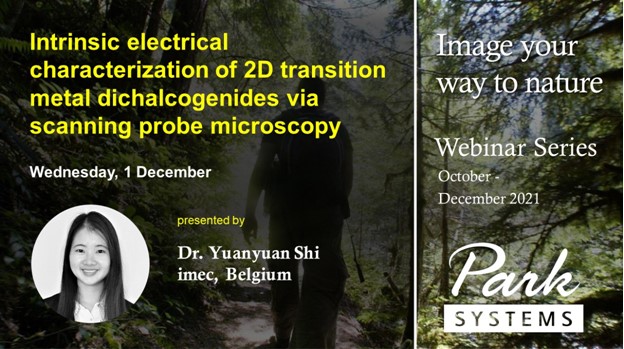
Intrinsic electrical characterization of two-dimensional transition metal dichalcogenides via scanning probe microscopy
Wednesday, 1 December, 2021
- 10:00 am – 11:30 am
(GMT)
London, Dublin - 11:00 am – 12:30 pm
(CET)
Berlin, Paris, Rome - 18:00pm – 19:30 pm
[UTC+9]
Seoul, Tokyo

See all webinars in the “Image your way to nature” series here.
In a conventional planar silicon field effect transistor (FET), the gate controllability becomes weaker when its lateral dimension becomes smaller than the transistor thickness, which results in adverse short-channel effects, including leakage current, saturation of the carrier mobility in the channel, channel hot-carrier degradation, and time-dependent dielectric breakdown. Hence, the transistor body thickness needs to be reduced to ensure efficient electrostatic control from the gate. Due to the atomic thickness and dangling bond-free surface of two-dimensional (2D) materials, theoretical studies have shown that particularly 2D transition metal dichalcogenides (TMDs), can outperform Si as the channel material, enable the atomic-level scaling, excellent electrostatic gate control, decrease off-state power consumption and further extend Moore’s Law.
Suitable techniques to characterize the intrinsic physical and electrical properties of as-deposited 2D materials, are a key link between the quality of as-deposited 2D materials and the performance of 2D materials based electronic devices. This link can help us to better understand, control and improve the performance of 2D materials-based devices. However, techniques for analyzing the intrinsic electrical properties of as-deposited 2D materials on the nanoscale without any transfer and patterning process are limited.
In this seminar, scanning probe microscopy (SPM) is used to investigate the intrinsic electrical properties of as-deposited 2D TMDs. Conductive atomic force microscope (CAFM) is performed directly on the surface of as-grown 2D materials without any patterning. CAFM allows correlating the electrical conductivity of as-grown 2D materials to their topography, thereby linking the electrical properties of 2D materials to their physical properties such as layer thickness and chemical bonds, etc. With all of this, CAFM gives us comprehensive information of as-deposited 2D materials and helps us to evaluate the impact of these intrinsic properties on 2D materials based nanoelectronics.

Presented By :
Dr. Yuanyuan Shi, imec Belgium
Dr. Yuanyuan Shi is a researcher (Marie Curie fellow) at IMEC, Belgium. She received her Ph.D. degree (with Excellent “Cum Laude” Honor and Extraordinary PhD prize) in Nanoscience from University of Barcelona in 2018. Her research interests focus on novel materials and new concepts/architectures based nanoelectronics, which target to bring new opportunities for the Post-Moore Era. Dr. Shi has published more than 60 research articles (including Nature Electronics, IEDM, ACS Nano, etc.), two book chapters and four international patents. She serves as an active committee member for IEEE EDS Nanotechnology committee and several IEEE flagship conferences, including IPFA, IRPS and EDTM. Dr. Shi also serves as a guest editor for Frontiers in Neuroscience and an active reviewer for Nature, Nature Electronics, Nature Materials, IEEE Electron Device Letters, and others. Dr. Shi is a recipient of 2020 Forbes 30 under 30 (Forbes), Marie Skłodowska-Curie Individual Fellowship (European Commission), 2020 Park AFM award (Park Systems), 2018 IEEE EDS PhD student fellowship (three winners globally each year), 2018 ADF-The Rising Stars Women in Engineering, etc.




